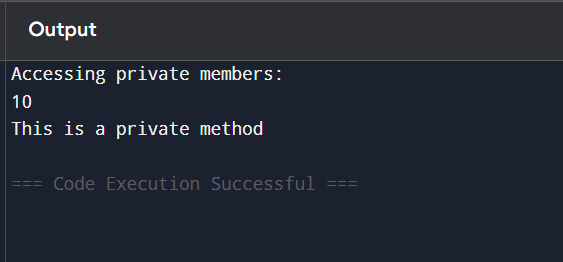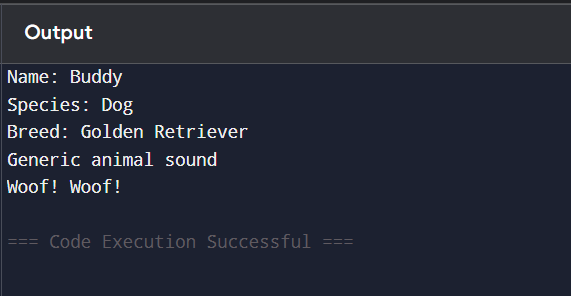Table of Contents
ToggleAccess modifiers in Python
Access modifiers in python are defined as an important part of the visibility and accessibility of data members in the field of object-oriented programming. In Python, Access modifiers help to define how classes, methods, and variables can be accessed and modified.
In this blog, we will explain to you thoroughly the access modifiers and their types, applications, and the role they play in maintaining encapsulation and code security.
So let’s understand the topic deeply
What are Access Modifiers in Python?
Object-oriented programming languages like Python control the accessibility of variables and methods. Access modifiers in Python, also known as access specifiers, are the keywords in object-oriented programming.
Python used the ‘_’ symbol to define the accessibility and control of data members of the class.
Access modifiers play a crucial role in maintaining data security and preventing unauthorized modifications.
Types of Access Modifiers
There are three types of access modifiers:
Public Access Modifier: The members defined in the public class can be accessed from anywhere.
Protected Access Modifier: The members defined in the protected class can only be accessed from within the class in which they are declared and by its subclasses.
Private Access Modifier: The members defined in the private class can only be accessed by class members.
Also Read: Linear Search In Python
Public Access Modifier
It is the least restrictive, it allows access to the member from anywhere in the program. It has vast scope and it will remain even after the termination.
Example in Python:
Output-

Private Access Modifier
It is the most restrictive among all modifiers. It limits the access of members within the same class. Prevent unauthorized access and secure the data. It also maintains a high class of encapsulation.
Example in Python-
Output-

Enroll now and take the first step toward a successful career. Click here to join our courses today!
Protected Access Modifier:
A protected access modifier allows members to be accessed by members within a class or by its subclasses. It maintains the balance of public and private modifiers. It also supports inheritance. The protected access modifier is used when the same level of visibility is needed for both the derived class and the base class.
Example in Python:
Output-

Importance of Access Modifiers
Encapsulation is a concept of object-oriented programming in which it binds up the data into a single unit. Access modifiers in python play a vital role in encapsulation; they help hide internal information and show only the necessary details by restricting access to different members.
Security: The access modifier helps to maintain the security of the program by limiting access to sensitive data. It makes sure that the members can only be accessed by members of the same class.
Code organization: Access modifiers organize the code and improve its readability and maintenance. It divides and boundaries the members into public and private members, in which public members are shown to the world and private members are kept hidden.
Inheritance and polymorphism: Inheritance is a feature of object-oriented programming that depends on access specifiers. It allows derived classes to access the elements of the base class. It promotes code reusability.
Also Read: How To Check For Armstrong Number In Python?
Best Practices for Using Access Modifiers:
Minimize Access: Minimize the exposure of implementation details by hiding the unnecessary details. This promotes encapsulation and prevents unauthorized access.
Use access modifiers. Consistently: Choose a specific modifier wisely based on visibility and work on its pattern consistently.
Review and Refactor: Recheck or review the access modifiers regularly throughout the code because they may change their visibility, and it is important to adapt the access modifiers.
Consider future changes: Predict the future of the codebase and structure the access specifiers according to it.
Conclusion
- In conclusion, effectively implementing the access modifiers is important to have a secure code.
- Developers can control the accessibility of code by carefully choosing the access modifiers.
- Access modifiers encourage the security of code and prevent unauthorized access.
- It also supports object-oriented concepts like encapsulation.
Enroll now and take the first step toward a successful career. Click here to join our courses today!
FAQs
Q1: What are access modifiers in python?
Answer: The access modifiers in python is a keyword that controls the accessibility of the class, hides the internal implementations, and enhances security.
Q2: Why are access modifiers important in programming?
Answer: Access modifiers are important as they control the accessibility of code, promote encapsulation, hide the internal implementation, and maintain security.
Q3: What are the common types of access modifiers?
Answer: There are three types of access modifiers:
Public access modifiers
Private access modifiers
Protected access modifiers
Q4: How does using access modifiers improve code security?
Answer: Access modifiers improve security by limiting the accessibility of elements and preventing unauthorized access.
Q5: Can access modifiers be used in different programming languages?
Answer: Yes, the concept of access modifiers can be used by many programming languages.
Want to start a career in Python Programming call us +91 8600998107 / +91 7028710777 For more details.















